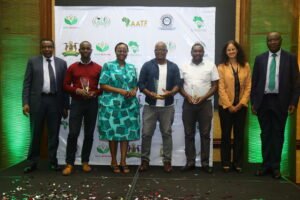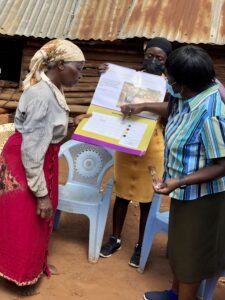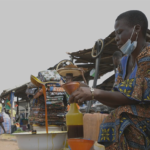By Vitumbiko Chinoko October 17, 2022
Africa’s agricultural development actors this month marked the 2nd Open Forum on Agricultural Biotechnology (OFAB) Day in Accra, Ghana, organized by the African Agricultural Technology Foundation (AATF).
OFAB Day is dedicated to appreciating the role of biotechnology science in Africa’s agricultural development agenda. The 1st OFAB Day was held in Nairobi, Kenya.
This year’s forum organized by OFAB Ghana Chapter, honoured policymakers, scientists and farmers from OFAB countries who have championed agricultural biotechnology in their belief that it has the potential to uplift the African people’s livelihoods.
The honorees’ expertise and influence has helped promote the role of science in the growth of sustainable agricultural development in Africa.
Africa has made some progress in advancing crop biotechnology. For example, in West Africa, Nigeria has commercialized the Pod Borer Resistant (PBR) cowpea, while Ghana has approved PBR cowpea for environmental release and could soon steer the process to place the technology in the hands of smallholder farmers.
Ghanaian farmers will have a modern seed variety available to contribute to the country’s food and nutrition security.
AATF has recently partnered with the governments of Malawi, Mozambique and Rwanda, opening a total of 10 new OFAB chapters advocating for a functional enabling environment for the commercialization of agricultural biotechnology.
The OFAB chapters aim at educating and sensitizing more people on the benefits of biotechnology in agriculture, working together with governments, the private sector, civil society and farmers to support agricultural biotechnology in Africa.
In the spirit of the words of Nelson Mandela, ““If you want to go fast, go alone, if you want to go far, go together”, AATF wants to expand engagement and friendships far and wide at the national, regional and continental level.
AATF believes that agricultural biotechnology has a role to contribute to the growth of Africn agriculture, anchored in the African Union’s Agenda 2063, the Malabo Declaration, and the Africa Continental Free Trade Agreement (AfCTA).
OFAB continues to lead efforts to foster constructive dialogue on the potential of safe, effective, and affordable biotech crops to deliver significant benefits to African farmers.
There is a clear connection between enhanced stakeholders’ knowledge and prosperity and the adoption of best farming practices. Hence changing the people’s knowledge, attitudes, and practices on agricultural biotechnology will lead to increased adoption of biotechnology solutions in Africa.
While African farmers are beginning to innovate, increase productivity, and drive unprecedented progress across economies, climate change is a constant threat to the agricultural sector.
OFAB will therefore guide the conversation on how agricultural biotechnology can be a solution to the reduction of emissions and the improvement of resilience from the adverse impacts of climate change.
Further, AATF heeded the call at Africa’s premier agriculture forum, AGRF 2022 held in Kigali, Rwanda from 6-9 September for the continent to embrace food systems as the guiding principle to how we produce, process, market, and consume food – and build resilience at every level of our agricultural value chains.
During the forum, Ghanaian plant geneticist Eric Yirenkyi Danquah was announced the winner of the Africa Food Prize, the preeminent award that recognizes outstanding individuals or institutions leading the effort to change the reality of farming in Africa.
Danquah was celebrated for his outstanding expertise, leadership and grantsmanship skills that led to the establishment of the West Africa Centre for Crop Improvement (WACCI), a world-class centre for training plant breeders in Africa for Africa.
Africa continues to feel the shocks of successive crises including the Covid-19 pandemic, climate change, the high price of food, and the crisis levels of hunger and food insecurity which have placed an extraordinary strain on our vulnerable food systems.
Biotechnology has an important role to play at this turning point for African agriculture and food systems alongside the commitments and actions that will guarantee and advance the future of Africa’s food security and prosperity.
Vitumbiko Chinoko, is the Project Manager, Open Forum on Agricultural Biotechnology (OFAB) at African Agricultural Technology Foundation (AATF)







